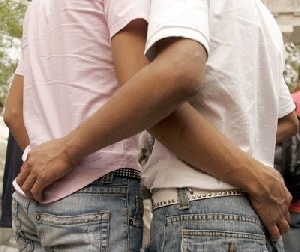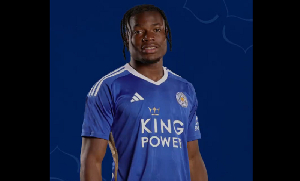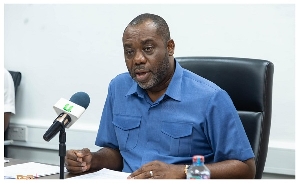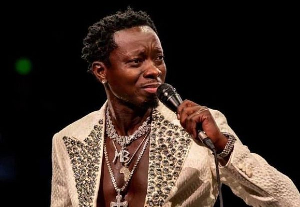- Home - News
- TWI News | TV
- Polls
- Year In Review
- News Archive
- Crime & Punishment
- Politics
- Regional
- Editorial
- Health
- Ghanaians Abroad
- Tabloid
- Africa
- Religion
- Election 2020
- Coronavirus
- News Videos | TV
- Photo Archives
- News Headlines
- Press Release
Opinions of Thursday, 26 May 2016
Columnist: George Nyavor and Prince Appiah
Life in the shadows: Living as a homosexual in Ghana
Gays in Ghana face fierce discrimination, which is why their voices aren’t often heard. George Nyavor and Prince Appiah, both staff of the Multimedia Group met with a lesbian and a gay who share their story.
This article is an adaptation of a documentary on Thursday May 26, 2016 on Joy FM. The Hotline Documentary titled "The Gay Next Door" recounts one of the most sensitive topics in Ghana, as it is regarded as a no-go area for discussion.
The quest to understand the issue led Luv FM's Prince Appiah and Myjoyonline.com’s George Nyavor to find out if indeed there are practicing homosexuals in the country.
They bring you chilling accounts of some gays and lesbians living in Ghana.
The Oxford Street is bursting at the seams because of the Homowo festival street jam. Thousands of young people – and some older folks too – have come out to drink, smoke and dance the night away.
It’s 11 pm on a Tuesday in August of 2015, but the clatter from tooting car horns, loud music and roaring shouts from revelers would make you question your sense of time.
Vicker and her friends have come out to join the fun. Vicker is almost forty, but she looks twenty-five and she is a lesbian.
“Yo! What’s up!” she raises her hand to respond to a shout out from someone in the crowd.
Vicker is clad in white: shorts, a T-Shirt and sneakers. In her left hand is an unlighted stick of cigarette, in her right hand she holds the rim of a plastic cup half-filled with rum.
It took days to get a gay person to grant a taped interview, almost every gay person we scheduled to meet cancelled at the last minute: they can’t trust the media, they say.
Vicker’s masculine voice and her punk-shaped hair-do almost create the impression that she is male.
“I have a female body, but I think I am male inside,” she says. She is not exactly out to the public, but talking to this woman, one has not the impression that she tries to hide her orientation.
“When I am passing people start pointing fingers. They say things like ‘agblakpo’” - a nasty word that translates into ‘pulling the clitoris’ in Ga, her native language. And then, imitating the moves of a Hip Hop singer, she proudly adds. “But I was able to issue a warning and they stopped.”
27-year-old Abeiku giggles as we tell him we have to speak to him about is sexuality. He was recommended to us by one of his close friends. Unlike Vicker who is a woman but feels like a man, Abeiku is the opposite. He feels like a woman.
Abeiku sits on a weak kitchen stool, his knees close to each other with one arm supporting his jaw and the other on his waist.
Abeiku was born with innate feminine characteristics that are evident in his speech and gestures. Abeiku lived with his family. Life was good until the parents divorced, he tells us, flailing his arms like a lady will typically do.
After his dad and mom split, life became difficult to the extent that he had to drop out of school, resort to selling on the streets to ensure his sister continues her education.
The frustration from this point was too much, so he found help in an elderly man in his neighbourhood. But the ‘Good Samaritan’, abused him. He was buggered the first time, but he would subsequently chase after his abuser for sex.
He explains his affection for his abuser grew so fierce that he moved from Accra to Kumasi to be close to him. Things did not work out as planned. He would find another male lover just to get shelter and work, however, this too would fall on the rocks. He left him.
After a short spell in Kumasi, Abeiku moved back to Accra. He got a job and found love in a young guy – that too brought him trouble. His lover's parents accused him of raping their son. He was imprisoned.
After prison, Abeiku became a misfit in his neighbourhood because people started pointing fingers at him and name calling started. According to Abeiku, his father disowned and threatened to kill him after hearing he is gay, a situation Abeiku says breaks his heart.
Homosexuality is not illegal in Ghana. However a law forbidding “unnatural carnal knowledge” can result in prison terms for homosexual couples. Moreover the Ghanaian society is hostile towards gays and lesbians.
People believed to be gay are regularly insulted or beaten up, says George Owoo, who is director of Human Right Advocacy Centre, an organization that provides legal and counselling support to homosexuals. In 2015 alone, close to twenty people were attacked because they were suspected to be gay.
On Tuesday, November 10, a young man in his late twenties applied make up and headed to the Kejetia Market to buy clothes. His queer behaviour caused some hawkers to throw objects at him. It took the timely intervention of the Kejetia Police to save his life.
In yet another attack, one Albert Appiah was beaten up by a mob which claimed he was gay. He was also saved by the intervention of the police. Two students of the Opoku Ware School were also nearly lynched because the students suspected they were gay.
“It’s time for us to empower people to know that no matter who you are and what your social status is, you can come out”, says George Owoo, who say poor homosexuals are those who get beaten. The rich ones are feared. But in a religious society like Ghana’s, this seems far away.
Churches and some chiefs actively campaign against people like Vicker and Abeiku. They consider Homosexuality a sin and alien to Ghanaian culture. Vicker however says she was once an active Presbyterian. She says during church service, she shivers when whole sermons are dedicated to the curse of homosexuality.
“I get afraid sometimes”, she says as her voice gets sombre. It is one of few moments that evening, when she seems a little insecure. “Sometimes I pray for my God to just forgive me” she admits. “He knows who I am. He should just forgive me and give me a resting place in His bosom,” Vicker says.
The street jam on the Osu Oxford street has been going on since 5 pm, but now the night sky is dark. Tired, drunk and high revelers have taken over the road, dancing, hugging and touching, preventing drivers from moving. Vicker watches as a driver toots his car horn and moves abruptly forward to disperse a group of guys blocking his way.
She takes firm strides towards the car, bangs the bonnet. “Hey, my man relax”, she orders the impatient driver.
A few years ago, Vicker gave in to pressure from her mother to marry a man. She gave birth to two boys, now aged seven and nine, but the marriage shortly fell on the rocks when the man heard rumours about her sexual orientation.
“It’s because I am a lesbian”, Vicker recounts. It is the first time she is using the word in the conversation.
Vicker says that since school days, she has fallen in love with girls. “I feel comfortable with a woman”, Vicker says as she waves confidently at two pretty ladies approaching her.
Vicker has brought her girlfriend to the party. The woman does not want to be interviewed. Instead she watches us from a distance. She beckons at her girlfriend to hurry up. Vicker has been talking to us for long, perhaps.
Vicker explains it was difficult for her to find a steady girlfriend. Most women she met feared to open up to the wrong person, she recounts. “My girlfriend for instance when I was chasing her, she was so tough. She said she wasn’t into that. But finally she gave in,” she recalls.
Religious leaders and chiefs have called on President John Mahama to declare a stance against homosexuality. Vicker too wants the President to speak out about homosexuality. She, however, does not want him to condemn it:
“Mahama should be bold and tell the world, everybody has rights…because I don’t think anyone must be stopped from doing what he or she wants to do. If he is able to do that I think we also can come out proud and tall”, Vicker says.
Both Abeiku and Vicker believe gays will boldly come out if Ghana’s President supports their rights to be homosexuals. “They are suppressing us, seriously,” says Vicker.
We thank Vicker for speaking to us, she does same -- happy she has been able to share her story. She shakes our hands, lights a cigarette and disappears in the direction of her girlfriend, snaking through the happy crowd and into the cold August night.











